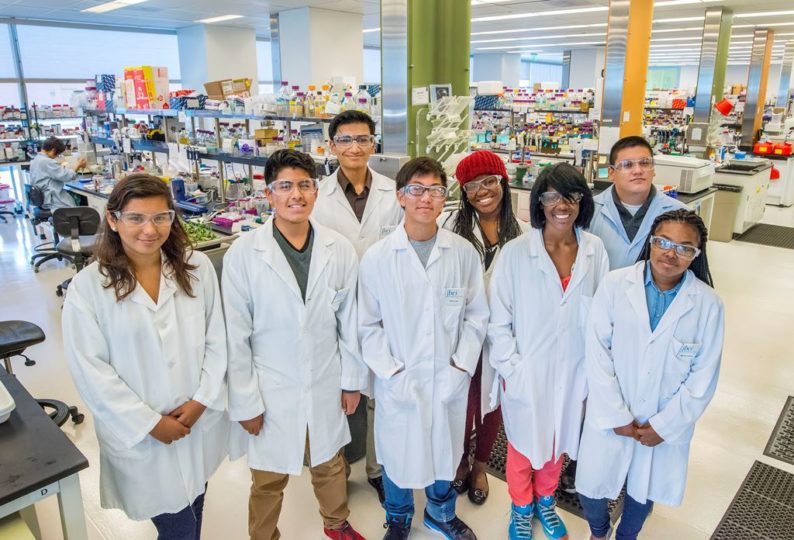Students returning to school this fall will inevitably be asked: What did you do during the summer break? For eight Bay Area high school students the atypical answer will be: Conducted scientific research on bioenergy at a state-of-the art laboratory.
A program known as “iCLEM,” which stands for Introductory College Level Experience in Microbiology, provides a paid summer internship for high-potential, low income high school students who have finished their junior or sophomore year. Sponsored by the Joint BioEnergy Institute (JBEI) and the Synthetic Biology Engineering Research Center (Synberc), with funding from the U.S. Department of Energy (DOE) and the National Science Foundation (NSF), iCLEM pays the students a total of $2,000 upon completion of an eight-week program in which they do real science in collaboration with high school science teachers and researchers from JBEI and Synberc.
“The ability to participate in a real-world laboratory experience at such a young age is an opportunity very few students have, and it can really help shape their future whether or not they continue in a STEM field,” says Shaila Kotadia, Synberc’s manager for education and outreach, who heads the iCLEM program. “Working in a lab really challenges the students to think critically and tackle problem-solving, which are skills that are necessary for all professions. In addition, iCLEM students are exposed to a wide range of mentors that enable them to learn from our experiences and knowledge, and to connect with professionals in the STEM fields.”
The iCLEM program, which was started in 2007 by Clem Fortman and James Carothers who were then post-doctoral researchers at JBEI and Synberc, has seen 97-percent of its alums attend college, with nearly 80-percent of those students majoring in STEM (science, technology, engineering and mathematics) fields.
“The idea is to provide an opportunity that could make a critical difference in the lives of students who are from economically disadvantaged backgrounds and have little or no family history of college attendance,” iCLEM co-founder Fortman said, when the program was launched. “We believe that given a chance to excel, these students will make the most of the opportunity.”
Students participating in iCLEM 2014 are Manisha Adrow and Hammad Zahid of Berkeley High School; Danyelle Cross of McClymonds High School; Velmoh Cooper, Aaron Lee and Karen Ochoa of Oakland Technical High School; David Garcia of Oakland Unity High School; and Brandon Martinez of Richmond High School.
“It has been amazing to observe these students conducting experiments in the lab,” Kotadia says. “They were given a brief overview of the protocol in the classroom and then went straight to it. Having worked in a lab myself and mentored undergraduates to postdocs, I was highly impressed by their ability to work safely and efficiently, and their ability to understand each step in the protocol.”)
This year’s student iCLEM program is running from June 23 to August 6. The typical work schedule is Monday through Friday from 9:00 am to 5:00 pm. In addition to bioenergy research projects, the iCLEM curriculum also includes field trips to Bay Area biotech companies and research universities, and lectures from leading scientists at JBEI and Synberc. They also get “college knowledge” – help on preparing personal statements for their college applications, as well as instructions on resumé-building and other skill-sets they will need as they continue their educational paths.
The science teachers working with the students in this summer’s iCLEM program are Peter Chukwu of Concord High School, and Jessie Conley of Las Lomas High School. They are being assisted by Lara Volker and Lara Hovsepian-Ruby, both undergraduate science majors at the University of California (UC) Berkeley.
“This year’s iCLEM program is a bit more organic from previous versions in that the teachers evaluate how the students are doing in the lab and on their college knowledge work and decide which areas to concentrate on,” says Kotadia, who holds a Ph.D. in genetics and development from the University of Texas Southwestern Medical Center, and served as the Science Policy Fellow at the American Society for Biochemistry and Molecular Biology before coming to Synberc. “In addition, I have tried to see what areas of science the students are interested in and connect them to my colleagues either via email or on-site presentations. I want to make their experience similar to working in an academic lab rather than taking a course.”
The 2014 iCLEM program will conclude with the students giving an oral presentation on their work. All of the iCLEM laboratory work is carried out at JBEI, which is located in Emeryville. JBEI is one of three Bioenergy Research Centers funded by DOE to advance the development of the next generation of biofuels. It is a multi-institutional scientific partnership led by Lawrence Berkeley National Laboratory (Berkeley Lab). Synberc is also a multi-institutional partnership, funded by NSF, aimed at “making biology easier to engineer.” Its mission is to lay the foundation for the emerging field of synthetic biology through the development of foundational understanding and technologies.
Additional Information
To learn more about the iCLEM program go here
